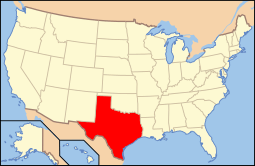Alcohol laws of Texas

A person must be at least be 21 years of age to drink an Alcoholic beverage in Texas. An operator of a motor vehicle is considered automatically under the influence of alcohol if a chemical screening shows a blood-alcohol content (BAC) of 0.08 percent or greater. If under the age of 21, a driver in Texas is not able to test positive for any blood-alcohol content (BAC) under penalty of DUI charges.
Wet and dry counties
Several counties are completely "dry" counties, where no sales of alcoholic beverages are legal anywhere in the county:[1]
- Armstrong
- Bailey
- Borden
- Collingsworth
- Crosby
- Delta
- Fisher
- Franklin
- Hemphill
- Kent
- Martin
- Ochiltree
- Panola
- Parmer
- Roberts
- Sterling
- Throckmorton
- Yoakum
Many counties are completely "wet" counties, where all alcoholic beverage sales are legal everywhere in the county:[1]
- Aransas
- Austin
- Bexar
- Brazos
- Brewster
- Brooks
- Cameron
- Childress
- Colorado
- Comal
- Cottle
- Culberson
- Dimmit
- Duval
- Ector
- El Paso
- Fayette
- Fort Bend
- Goliad
- Gonzales
- Guadalupe
- Hidalgo
- Hudspeth
- Jim Hogg
- Kendall
- Kenedy
- Kinney
- Kleberg
- La Salle
- Midland
- Mitchell
- Nolan
- Nueces
- Presidio
- San Saba
- Scurry
- Sherman
- Starr
- Sutton
- Val Verde
- Victoria
- Washington
- Webb
- Wharton
- Wilbarger
- Zapata
- Zavala
All other counties are a combination of wet and dry areas.[1]
Legitimate Age
People must be at least 21 years of age to legally consume alcoholic beverages in Texas with certain exceptions, as in any other state in the United States. However, employment or service which requires vending or handling alcoholic beverages can be entered into at age 18.
Open Container Laws
All previously opened containers of alcoholic beverages must be stored and transported in a vehicle’s trunk or other storage to which the driver and or any passengers do not have access.
Blood Alcohol Content Limits
An operator of a motor vehicle is considered under the influence of alcohol if a chemical screening test shows a blood-alcohol content of 0.08 percent or higher. No other evidence (such as Field Sobriety tests) need be presented to the court to obtain a DUI (driving under the influence) conviction. A driver testing 0.15 percent or more over the legal limit of 0.08 percent faces more severe penalties for enhanced BAC. When under the age of 21, a driver in Texas must not test positive for any blood-alcohol content (BAC) and may be charged with DUI even if the amount tested is under 0.08 percent.
See also
References
- ↑ 1.0 1.1 1.2 "Wet and Dry Counties". Texas Alcoholic Beverage Commission. Retrieved 7 July 2013.
External links
| ||||||||||||||